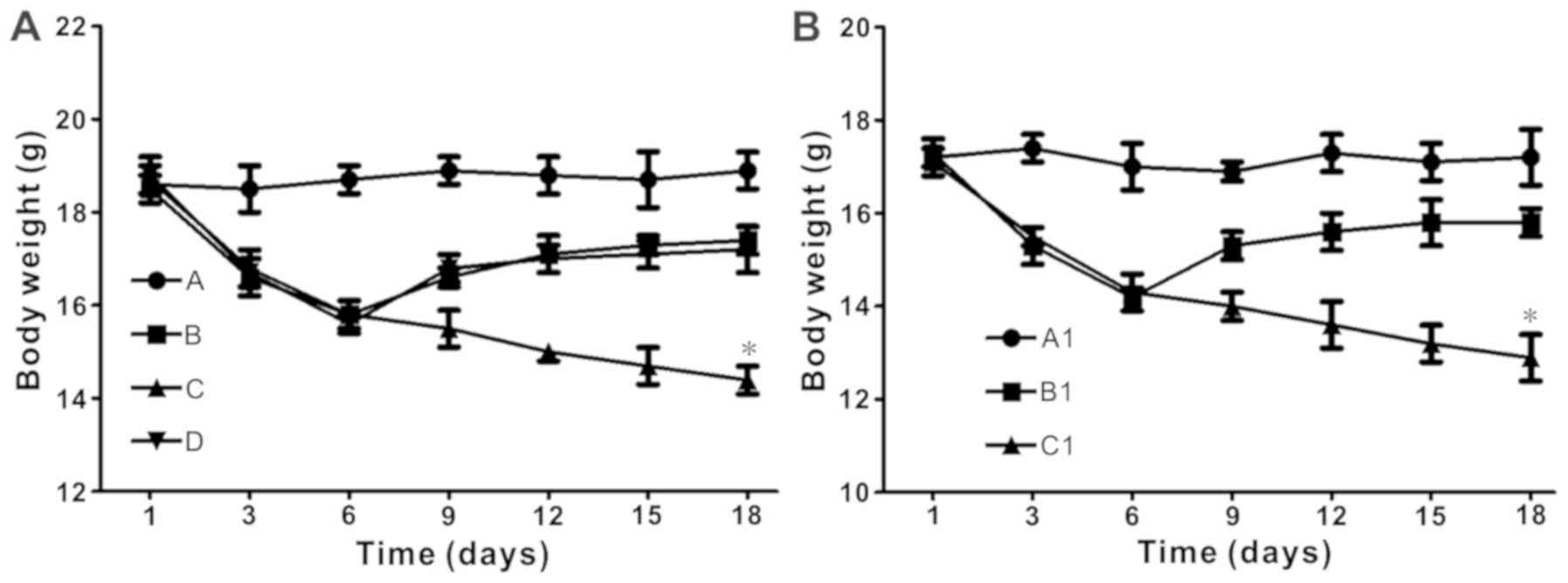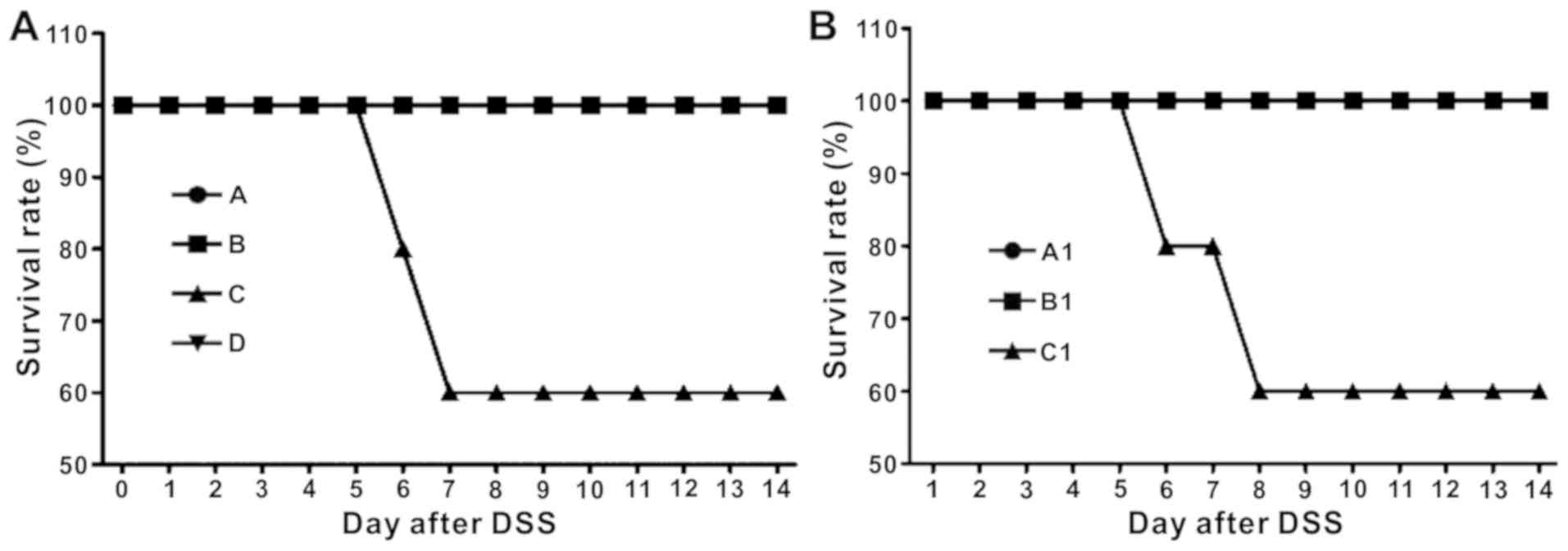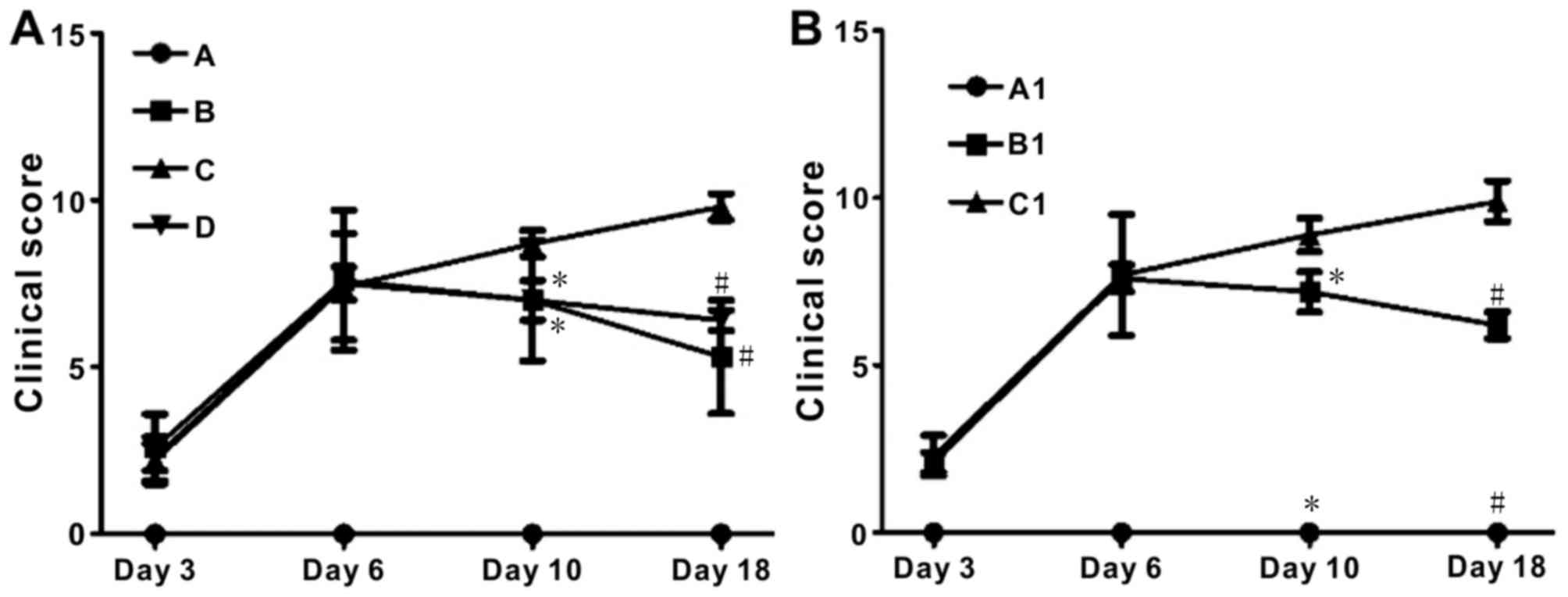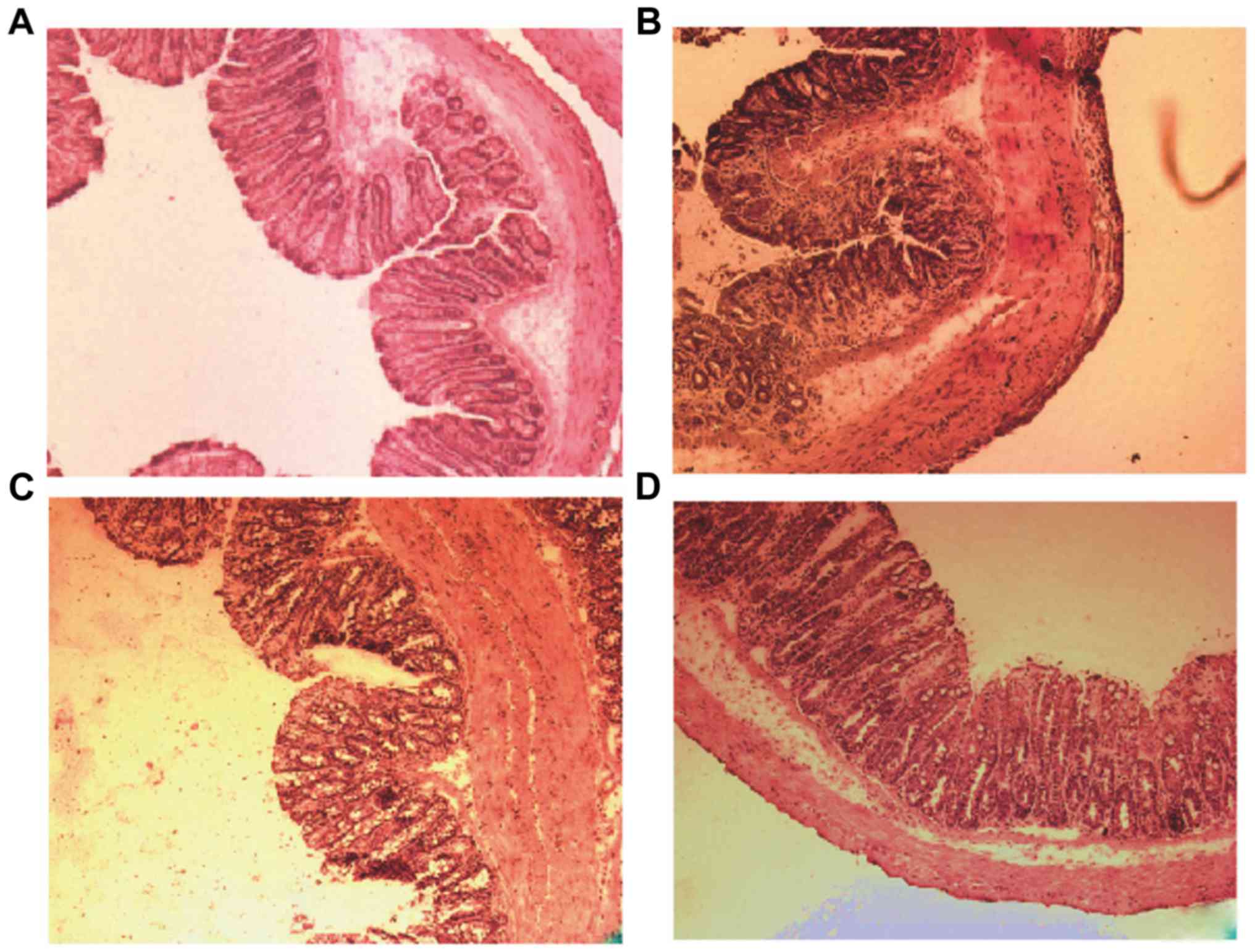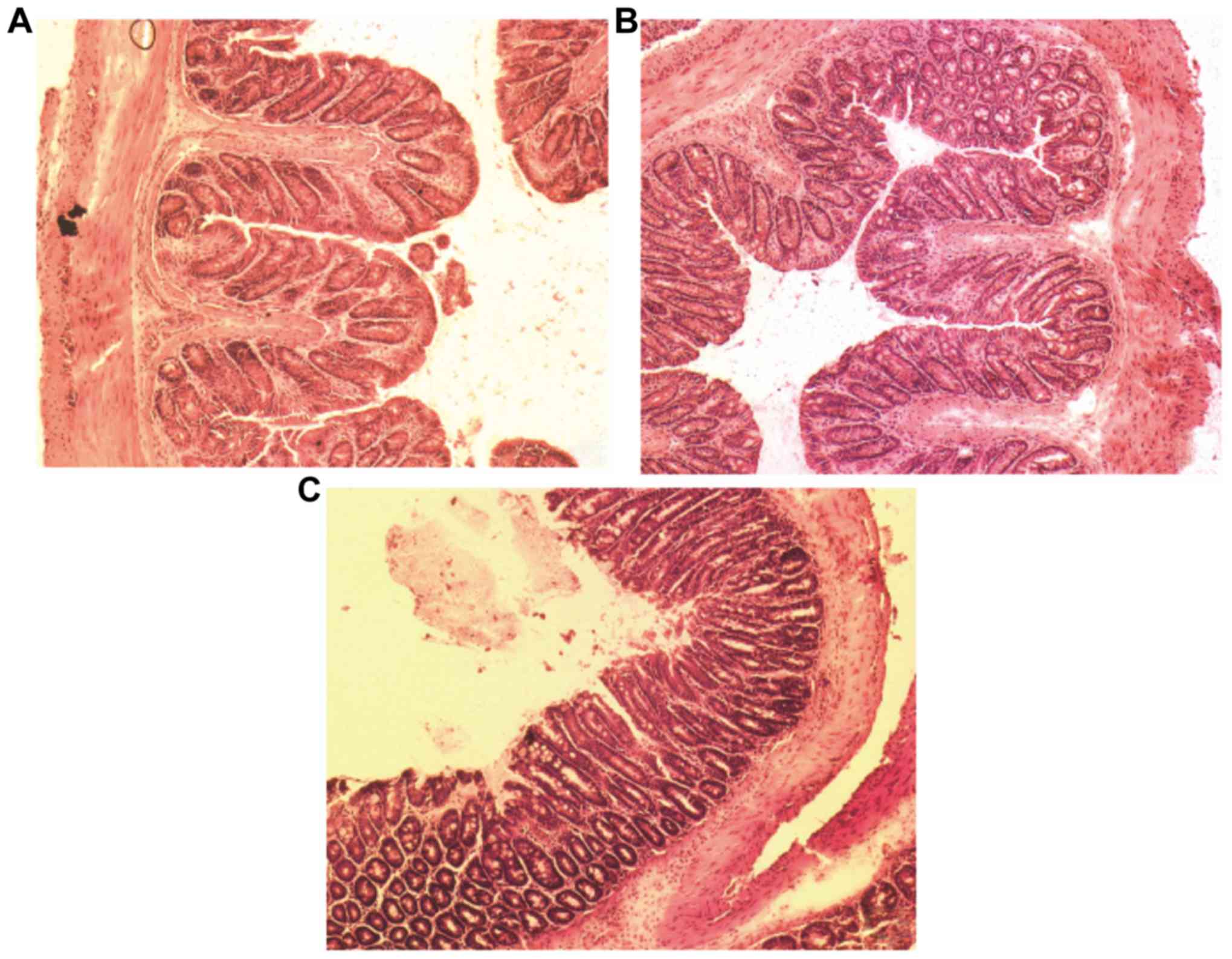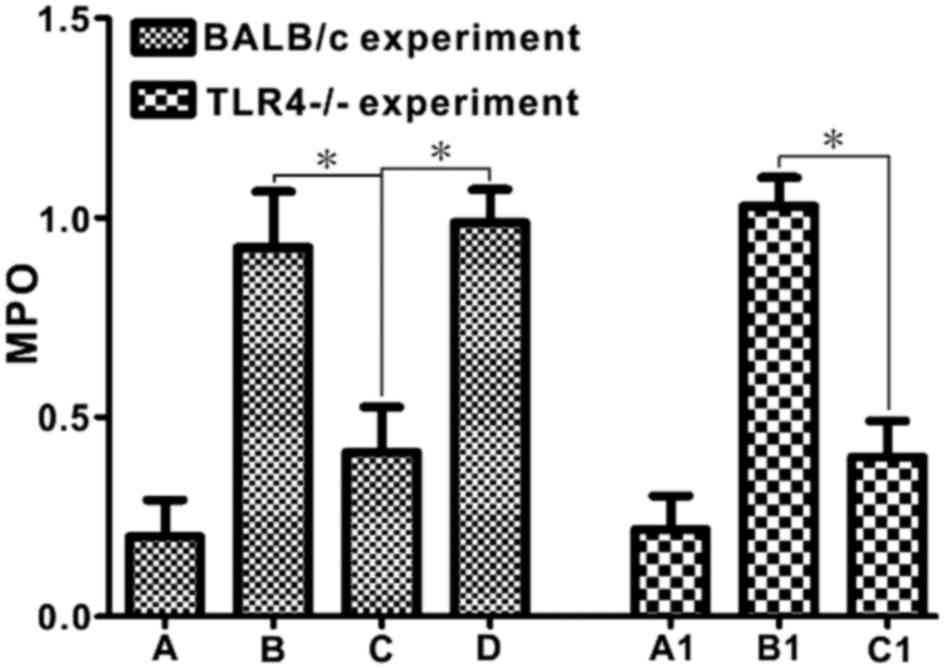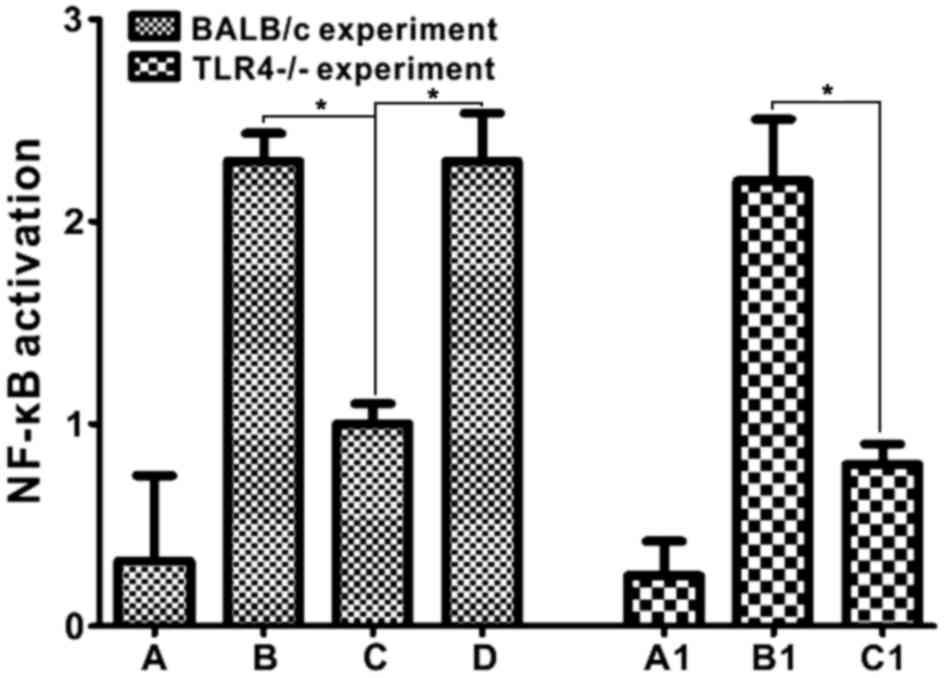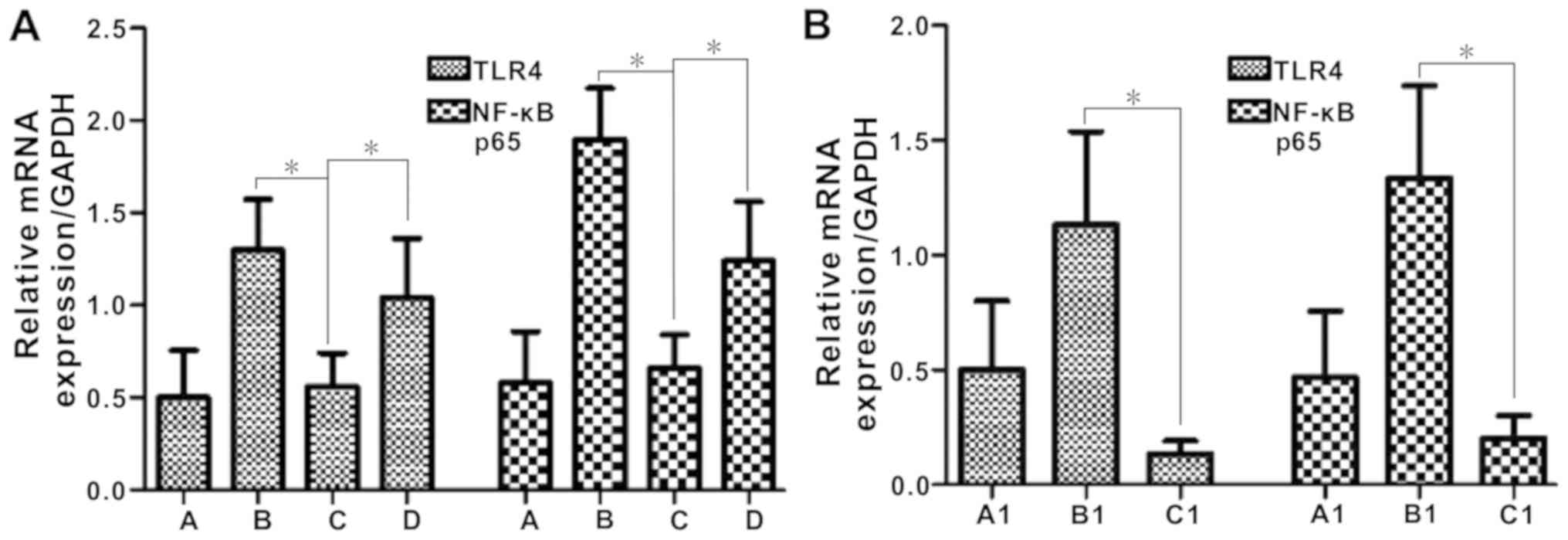|
1
|
Baumgart DC and Sandborn WJ: Inflammatory
bowel disease: Clinical aspects and established and evolving
therapies. Lancet. 369:1641–1657. 2007. View Article : Google Scholar : PubMed/NCBI
|
|
2
|
Egger B, Bajaj-Elliott M, MacDonald TT,
Inglin R, Eysselein VE and Büchler MW: Characterisation of acute
murine dextran sodium sulphate colitis: Cytokine profile and dose
dependency. Digestion. 62:240–248. 2000. View Article : Google Scholar : PubMed/NCBI
|
|
3
|
Prideaux L, Kamm MA, De Cruz PP, Chan FK
and Ng SC: Inflammatory bowel disease in Asia: A systematic review.
J Gastroenterol Hepatol. 27:1266–1280. 2012. View Article : Google Scholar : PubMed/NCBI
|
|
4
|
Sellon RK, Tonkonogy S, Schultz M,
Dieleman LA, Grenther W, Balish E, Rennick DM and Sartor RB:
Resident enteric bacteria are necessary for development of
spontaneous colitis and immune system activation in
interleukin-10-deficient mice. Infect Immun. 66:5224–5231.
1998.PubMed/NCBI
|
|
5
|
Blum AM, Metwali A, Elliott DE, Berg DJ
and Weinstock JV: CD4+ T cells from IL-10-deficient mice transfer
susceptibility to NSAID-induced Rag colitis. Am J Physiol
Gastrointest Liver Physiol. 287:G320–G325. 2004. View Article : Google Scholar : PubMed/NCBI
|
|
6
|
Rutgeerts P, Goboes K, Peeters M, Hiele M,
Penninckx F, Aerts R, Kerremans R and Vantrappen G: Effect of
faecal stream diversion on recurrence of Crohn's disease in the
neoterminal ileum. Lancet. 338:771–774. 1991. View Article : Google Scholar : PubMed/NCBI
|
|
7
|
Khan KJ, Ullman TA, Ford AC, Abreu MT,
Abadir A, Marshall JK, Talley NJ and Moayyedi P: Antibiotic therapy
in inflammatory bowel disease: A systematic review and
meta-analysis. Am J Gastroenterol. 106:661–673. 2011. View Article : Google Scholar : PubMed/NCBI
|
|
8
|
Ananthakrishnan AN, Hur C, Juillerat P and
Korzenik JR: Strategies for the prevention of postoperative
recurrence in Crohn's disease: Results of a decision analysis. Am J
Gastroenterol. 106:2009–2017. 2011. View Article : Google Scholar : PubMed/NCBI
|
|
9
|
Jostins L, Ripke S, Weersma RK, Duerr RH,
McGovern DP, Hui KY, Lee JC, Schumm LP, Sharma Y, Anderson CA, et
al: Host-microbe interactions have shaped the genetic architecture
of inflammatory bowel disease. Nature. 491:119–124. 2012.
View Article : Google Scholar : PubMed/NCBI
|
|
10
|
Chen J, Xie L, Toyama S, Hünig T, Takahara
S, Li XK and Zhong L: The effects of Foxp3-expressing regulatory T
cells expanded with CD28 superagonist antibody in DSS-induced mice
colitis. Int Immunopharmacol. 11:610–617. 2011. View Article : Google Scholar : PubMed/NCBI
|
|
11
|
National Research Council (US) Committee
for the Update of the Guide for the Care and Use of Laboratory
Animals: Guide for the Care and Use of Laboratory Animals. 8th.
National Academies Press (US); Washington, DC: 2011
|
|
12
|
Cooper HS, Murthy SN, Shah RS and
Sedergran DJ: Clinicopathologic study of dextran sulfate sodium
experimental murine colitis. Lab Invest. 69:238–249.
1993.PubMed/NCBI
|
|
13
|
Loher F, Schmall K, Freytag P, Landauer N,
Hallwachs R, Bauer C, Siegmund B, Rieder F, Lehr HA, Dauer M, et
al: The specific type-4 phosphodiesterase inhibitor mesopram
alleviates experimental colitis in mice. J Pharmacol Exp Ther.
305:549–556. 2003. View Article : Google Scholar : PubMed/NCBI
|
|
14
|
Moriyama I, Ishihara S, Rumi MA, Aziz MD,
Mishima Y, Oshima N, Kadota C, Kadowaki Y, Amano Y and Kinoshita Y:
Decoy oligodeoxynucleotide targeting activator protein-1 (AP-1)
attenuates intestinal inflammation in murine experimental colitis.
Lab Invest. 88:652–663. 2008. View Article : Google Scholar : PubMed/NCBI
|
|
15
|
Krawisz JE, Sharon P and Stenson WF:
Quantitative assay for acute intestinal inflammation based on
myeloperoxidase activity. Assessment of inflammation in rat and
hamster models. Gastroenterology. 87:1344–1350. 1984.PubMed/NCBI
|
|
16
|
Becker C, Neurath MF and Wirtz S: The
intestinal microbiota in inflammatory bowel disease. ILAR J.
56:192–204. 2015. View Article : Google Scholar : PubMed/NCBI
|
|
17
|
Bantel H, Berg C, Vieth M, Stolte M, Kruis
W and Schulze-Osthoff K: Mesalazine inhibits activation of
transcription factor NF-kappaB in inflamed mucosa of patients with
ulcerative colitis. Am J Gastroenterol. 95:3452–3457. 2000.
View Article : Google Scholar : PubMed/NCBI
|
|
18
|
Zhang T, Su J, Guo B, Wang K, Li X and
Liang G: Apigenin protects blood-brain barrier and ameliorates
early brain injury by inhibiting TLR4-mediated inflammatory pathway
in subarachnoid hemorrhage rats. Int Immunopharmacol. 28:79–87.
2015. View Article : Google Scholar : PubMed/NCBI
|
|
19
|
Wang CX, Xie GB, Zhou CH, Zhang XS, Li T,
Xu JG, Li N, Ding K, Hang CH, Shi JX and Zhou ML: Baincalein
alleviates early brain injury after experimental subarachnoid
hemorrhage in rats: Possible involvement of TLR4/NF-κB-mediated
inflammatory pathway. Brain Res 1594. 245–255. 2015. View Article : Google Scholar
|
|
20
|
Livak KJ and Schmittgen TD: Analysis of
relative gene expression data using real-time quantitative PCR and
the 2(-Delta Delta C(T)) method. Methods. 25:402–408. 2001.
View Article : Google Scholar : PubMed/NCBI
|
|
21
|
Ray A and Dittel BN: Interrelatedness
between dysbiosis in the gut microbiota due to immunodeficiency and
disease penetrance of colitis. Immunology. 146:359–368. 2015.
View Article : Google Scholar : PubMed/NCBI
|
|
22
|
Loh G and Blaut M: Role of commensal gut
bacteria in inflammatory bowel diseases. Gut Microbes. 3:544–555.
2012. View Article : Google Scholar : PubMed/NCBI
|
|
23
|
Vigsnaes LK, van den Abbeele P, Sulek K,
Frandsen HL, Steenholdt C, Brynskov J, Vermeiren J, van de Wiele T
and Licht TR: Microbiotas from UC patients display altered
metabolism and reduced ability of LAB to colonize mucus. Sci Rep.
3:11102013. View Article : Google Scholar : PubMed/NCBI
|
|
24
|
Schultz M, Veltkamp C, Dieleman LA,
Grenther WB, Wyrick PB, Tonkonogy SL and Sartor RB: Lactobacillus
plantarum 299V in the treatment and prevention of spontaneous
colitis in interleukin-10-deficient mice. Inflamm Bowel Dis.
8:71–80. 2002. View Article : Google Scholar : PubMed/NCBI
|
|
25
|
Amar J, Chabo C, Waget A, Klopp P, Vachoux
C, Bermúdez-Humarán LG, Smirnova N, Bergé M, Sulpice T, Lahtinen S,
et al: Intestinal mucosal adherence and translocation of commensal
bacteria at the early onset of type 2 diabetes: Molecular
mechanisms and probiotic treatment. EMBO Mol Med. 3:559–572. 2011.
View Article : Google Scholar : PubMed/NCBI
|
|
26
|
Zhang R, Ito S, Nishio N, Cheng Z, Suzuki
H and Isobe KI: Dextran sulphate sodium increases splenic
Gr1(+)CD11b(+) cells which accelerate recovery from colitis
following intravenous transplantation. Clin Exp Immunol.
164:417–427. 2011. View Article : Google Scholar : PubMed/NCBI
|
|
27
|
Fabrega MJ, Rodriguez-Nogales A,
Garrido-Mesa J, Algieri F, Badía J, Giménez R, Gálvez J and Baldomà
L: Intestinal Anti-inflammatory effects of outer membrane vesicles
from Escherichia coli nissle 1917 in DSS-experimental colitis in
mice. Front Microbiol. 8:12742017. View Article : Google Scholar : PubMed/NCBI
|
|
28
|
French N and Pettersson S: Microbe-host
interactions in the alimentary tract: The gateway to understanding
inflammatory bowel disease. Gut. 47:162–163. 2000. View Article : Google Scholar : PubMed/NCBI
|















